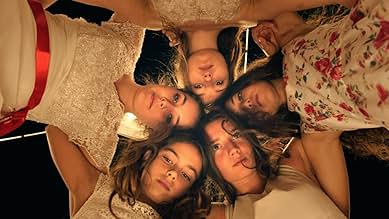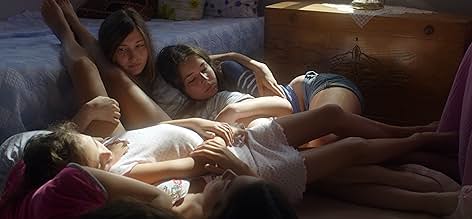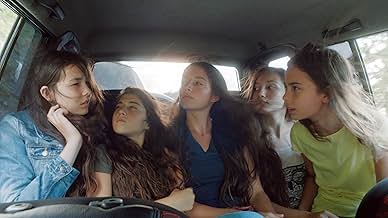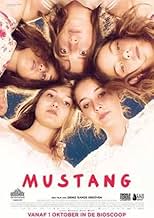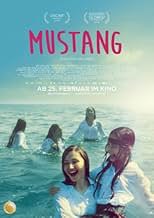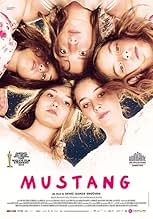Mustang
- 2015
- Tous publics
- 1h 37m
IMDb RATING
7.6/10
42K
YOUR RATING
When five orphan girls are seen innocently playing with boys on a beach, their scandalized conservative guardians confine them while forced marriages are arranged.When five orphan girls are seen innocently playing with boys on a beach, their scandalized conservative guardians confine them while forced marriages are arranged.When five orphan girls are seen innocently playing with boys on a beach, their scandalized conservative guardians confine them while forced marriages are arranged.
- Director
- Writers
- Stars
- Nominated for 1 Oscar
- 46 wins & 63 nominations total
Günes Sensoy
- Lale
- (as Günes Nezihe Sensoy)
Nihal G. Koldas
- The Grandmother
- (as Nihal Koldas)
- Director
- Writers
- All cast & crew
- Production, box office & more at IMDbPro
Featured reviews
Mustang is a Turkish movie inspired by Sofia Coppola's Virgin Suicides. It takes place in a remote village in Turkey and follows the story of five sisters whose very conservative family slowly takes away all forms of 'perversion' away from them in order to make them 'suitable wives'.
The movie doesn't beat you over the head with its feminist message but lets the drama unfold naturally. The tone is surprisingly sweet and even funny in places for a movie with such a subject matter. First time director Deniz Gamze Ergüven has a strong grip on tone; she never allows the movie to become too gritty for its own good. The girls are not defined by the plot like it's often the case with this type of movies; they have moments of laughs and happiness which never undermine the seriousness of the subject matter.
The performances from the lead actresses are phenomenal. The youngest girl blew me away - not once do you feel like she's acting. Their performances is what make them so distinctive from each other and not just stand-ins for Oppressed Muslim Girls TM like it's often the case.
Mustang is easily one of the best feminist movies of the year, proudly sitting next to The Diary of a Teenage Girl. It's sincere and heartfelt, it's not preachy but honest and it shows great premise for the future of its director. Don't miss it!
The movie doesn't beat you over the head with its feminist message but lets the drama unfold naturally. The tone is surprisingly sweet and even funny in places for a movie with such a subject matter. First time director Deniz Gamze Ergüven has a strong grip on tone; she never allows the movie to become too gritty for its own good. The girls are not defined by the plot like it's often the case with this type of movies; they have moments of laughs and happiness which never undermine the seriousness of the subject matter.
The performances from the lead actresses are phenomenal. The youngest girl blew me away - not once do you feel like she's acting. Their performances is what make them so distinctive from each other and not just stand-ins for Oppressed Muslim Girls TM like it's often the case.
Mustang is easily one of the best feminist movies of the year, proudly sitting next to The Diary of a Teenage Girl. It's sincere and heartfelt, it's not preachy but honest and it shows great premise for the future of its director. Don't miss it!
According to Wikipedia, "The English word mustang is derived from the Spanish word mestengo (variant of mesteño), defined as 'wild, stray, ownerless'." The image and idea of a wild, ownerless horse has inspired imaginations throughout the western world and led to the word mustang representing sports cars, airplanes, ships, cities, sports teams and even used by artists, musicians, businesses and by some politicians who consider themselves rogue agents of change. 2015 added to the word's long list of uses the French-Turkish drama "Mustang" (PG-13, 1:37), which became France's submission for the 88th Annual Academy Awards and was nominated for (and was a strong contender for) the Best Foreign Language Film Oscar. Given its subject matter and quality, "Mustang" is a great name for a great film.
The movie explores the relationships and lives of five adolescent sisters living in the seaside village of Inebolu in north-central Turkey. Inebolu is known for, among other things, the spirited (and successful) defense it mounted when attacked during the Turkish War for Independence. Fittingly, these five girls (played by Güneş Şensoy, Doğa Doğuşlu, Elit İşcan, Tuğba Sunguroğlu and İlayda Akdoğan) are also very spirited. You might even call them wild (in a strongly independent sense), they are kind of ownerless – as orphans living with their grandmother (Nihal Koldaş) and uncle (Ayberk Pekcan) – and they are quite prone to stray from the strict expectations of their strongly conservative society – as much as they can.
When the girls are caught innocently frolicking in the sea with some of their (gasp) male classmates one day after school, their lives change suddenly and dramatically. After much yelling and some beatings from their caregivers, the girls are confined to the house and lose almost all contact with the outside world, except for the people that their uncle and grandmother bring to the house. Telephones and computers are locked in a closet, bars are placed over the windows, clothing the girls chose for themselves are replaced by drab, formless dresses and daily life becomes an endless series of home economics classes in which female relatives come by to teach the girls how to be proper Turkish wives.
Also coming by the house is a parade of single young men with whom grandma begins arranging marriages for the girls. She's starting with the oldest and plans on working her way down the line. The girls, however, have other ideas. Without revealing too much about the rest of the movie, I'll just say that what grandma intends to be a succession of five cookie-cutter weddings doesn't work out exactly the way she and the girls' uncle plan. In spite of instances of abuse and the increasingly severe limitations on their personal freedom, the girls still fight to be themselves, spread their wings, meet boys on their own, keep supporting each other and enjoy each other's company as long as possible.
"Mustang" represents the best in foreign film. Besides co-writing the script, this is French-Turkish filmmaker Deniz Gamze Ergüven's directorial debut and she gives us a film which displays consistently expert tone and pacing. Some of the plot points feel overly dramatic, but this story takes an important look at extremely conservative southwestern Asia societies. Most westerners won't be able to readily relate to the lives of these girls, but the interesting story and very natural performances draw in the audience for an entertaining experience while helping them understand the world in which they live. "Mustang" is also largely a celebration of sisterhood and feminine empowerment, but it's hard to imagine anyone not being touched by this very personal and dramatic story. "A-"
The movie explores the relationships and lives of five adolescent sisters living in the seaside village of Inebolu in north-central Turkey. Inebolu is known for, among other things, the spirited (and successful) defense it mounted when attacked during the Turkish War for Independence. Fittingly, these five girls (played by Güneş Şensoy, Doğa Doğuşlu, Elit İşcan, Tuğba Sunguroğlu and İlayda Akdoğan) are also very spirited. You might even call them wild (in a strongly independent sense), they are kind of ownerless – as orphans living with their grandmother (Nihal Koldaş) and uncle (Ayberk Pekcan) – and they are quite prone to stray from the strict expectations of their strongly conservative society – as much as they can.
When the girls are caught innocently frolicking in the sea with some of their (gasp) male classmates one day after school, their lives change suddenly and dramatically. After much yelling and some beatings from their caregivers, the girls are confined to the house and lose almost all contact with the outside world, except for the people that their uncle and grandmother bring to the house. Telephones and computers are locked in a closet, bars are placed over the windows, clothing the girls chose for themselves are replaced by drab, formless dresses and daily life becomes an endless series of home economics classes in which female relatives come by to teach the girls how to be proper Turkish wives.
Also coming by the house is a parade of single young men with whom grandma begins arranging marriages for the girls. She's starting with the oldest and plans on working her way down the line. The girls, however, have other ideas. Without revealing too much about the rest of the movie, I'll just say that what grandma intends to be a succession of five cookie-cutter weddings doesn't work out exactly the way she and the girls' uncle plan. In spite of instances of abuse and the increasingly severe limitations on their personal freedom, the girls still fight to be themselves, spread their wings, meet boys on their own, keep supporting each other and enjoy each other's company as long as possible.
"Mustang" represents the best in foreign film. Besides co-writing the script, this is French-Turkish filmmaker Deniz Gamze Ergüven's directorial debut and she gives us a film which displays consistently expert tone and pacing. Some of the plot points feel overly dramatic, but this story takes an important look at extremely conservative southwestern Asia societies. Most westerners won't be able to readily relate to the lives of these girls, but the interesting story and very natural performances draw in the audience for an entertaining experience while helping them understand the world in which they live. "Mustang" is also largely a celebration of sisterhood and feminine empowerment, but it's hard to imagine anyone not being touched by this very personal and dramatic story. "A-"
Greetings again from the darkness. Writer/director Deniz Gamze Erguven admits to being inspired by Sophia Coppola's 1999 The Virgin Suicides (though this is not a remake), and by offering us a rare glimpse into the lives of five sisters in a rural community in Turkey, it's clear why the film has been so well received at film festivals – culminating in an Oscar nomination for Best Foreign Film. It's a bit confusing that the film is credited to France (Ms. Erguven's current place of residence) as it takes place in Turkey and is performed in Turkish. But of course, country of origin is a minor ripple in this year's uproar over diversity at the Oscars.
Not being any type of expert in Turkey culture or customs, I must accept that the insights provided by Ms. Erguven and her co-writer Alice Winocour are somewhat accurate, which makes the balance between the tradition of female oppression and the amazing spirit of the girls so relatable for many. What begins as a seemingly harmless game of chicken the girls play with some classmates (boys) on the way home after the semester's last day of classes, turns into a series of events that most will find absolutely unacceptable. The shame brought to the family and the threat of the girls being "spoiled" highlights the extreme reactions from their grandmother (Nihal G Koldas) and Uncle Erol (Ayberk Pekcan).
Lale (Gunes Sensoy) is the youngest of the sisters and in the end proves to be the toughest and most independent. And that's really saying something. We take in much of what happens through Lale's expressive eyes, and we as viewers long for reasonableness to enter their lives. After being what can only be described as imprisoned in their own home, the spirit of the girls collectively and individually becomes clear. They find ways, small and large, to rebel but it's soon enough clear that the mission is to marry the girls off before it's too late (there's that "spoiled" thing again).
As Lale witnesses what her older sisters are subjected to, and how happiness or their own wishes play no role, she becomes more determined to avoid such destiny. With skewed perspective, one might make the argument that Grandmother and Uncle are doing what they think is in the long term best interests of the girls, but the Uncle's despicable actions void any such thought. Instead we are left to marvel at the strength and spirit of the girls in world that holds them in such low regard as individuals.
Lale's sisters are Sonay (IIayda Akdogan), Nur (Doga Zeynep Doguslu), Selma (Tugba Sunguroglu) and Ece (Elit Iscan). The girls are so natural together that we never doubt their sisterly bond. They argue like sisters, defend each other as sisters, and play together like sisters were it not for their isolated existence, their bond would be a joy to behold. The cinematography throughout the film adds to the discomfort and dread we feel, and the acting is naturalistic and believable. In the end, it's the unbridled freedom of the titular creature that Lale defiantly embraces whatever the consequences may be.
Not being any type of expert in Turkey culture or customs, I must accept that the insights provided by Ms. Erguven and her co-writer Alice Winocour are somewhat accurate, which makes the balance between the tradition of female oppression and the amazing spirit of the girls so relatable for many. What begins as a seemingly harmless game of chicken the girls play with some classmates (boys) on the way home after the semester's last day of classes, turns into a series of events that most will find absolutely unacceptable. The shame brought to the family and the threat of the girls being "spoiled" highlights the extreme reactions from their grandmother (Nihal G Koldas) and Uncle Erol (Ayberk Pekcan).
Lale (Gunes Sensoy) is the youngest of the sisters and in the end proves to be the toughest and most independent. And that's really saying something. We take in much of what happens through Lale's expressive eyes, and we as viewers long for reasonableness to enter their lives. After being what can only be described as imprisoned in their own home, the spirit of the girls collectively and individually becomes clear. They find ways, small and large, to rebel but it's soon enough clear that the mission is to marry the girls off before it's too late (there's that "spoiled" thing again).
As Lale witnesses what her older sisters are subjected to, and how happiness or their own wishes play no role, she becomes more determined to avoid such destiny. With skewed perspective, one might make the argument that Grandmother and Uncle are doing what they think is in the long term best interests of the girls, but the Uncle's despicable actions void any such thought. Instead we are left to marvel at the strength and spirit of the girls in world that holds them in such low regard as individuals.
Lale's sisters are Sonay (IIayda Akdogan), Nur (Doga Zeynep Doguslu), Selma (Tugba Sunguroglu) and Ece (Elit Iscan). The girls are so natural together that we never doubt their sisterly bond. They argue like sisters, defend each other as sisters, and play together like sisters were it not for their isolated existence, their bond would be a joy to behold. The cinematography throughout the film adds to the discomfort and dread we feel, and the acting is naturalistic and believable. In the end, it's the unbridled freedom of the titular creature that Lale defiantly embraces whatever the consequences may be.
Five sisters play in the sand, sunlight, sea and a grove of apple trees. Because boys are present the innocent play is easily twisted, by an envious conservative busy-body, into something sinister. The orphan girls are reported as "whores." Their caretakers, an uncle and grandmother, are much less concerned about the truth than what the neighbors might say. The girls are confined to their house and relegated to shapeless brown dresses, cooking lessons and virginity tests. Banned items include phones, internet and any item capable of outside communication. Their once beautiful and happy playground on the Black Sea is transformed into a "wife-factory" with bars on the windows. Each girl deals with the physical and emotional imprisonment in different ways, sometimes hopeful and often not. The non-professional actors do really well. The girls are especially good because they gel so well together. On the other hand, some of the scenes and actors seem forced and unrealistic. As usual, this independent and worthy film might have benefited from better support. The film as a whole pulls some punches and risks becoming the Walt Disney of Turkey for its glossy portrayals of serious stuff. Then again, that might be the only way the film could be released widely? The moral here, for the girls' caretakers, is that you are likely to get burned if you fight fire with fire. "Evil must be your only happiness," when you see evil everywhere.
I am Turkish. I know how people behave in rural parts of Turkey. This movie is so ridiculously bad I would not waste another sentence for it if it wasn't for the minimal review length requirement of IMDb. So here it is, 10 lines... Actors do not even come close to give an authentic depiction of how people living in a village in İnebolu act and behave. The story is a disaster. The general attitude of the movie is tastelessly didactic. Don't you ever think that you get a somewhat accurate representation of anything regarding Turkish society from this excuse of a movie. The director/writer does obviously not know how things work in rural parts of Turkey. One of the writers is not even Turkish. So, go figure... The fuss around this movie (oscar nomination etc.) is a textbook case of westerners appreciating narratives about the rest of the world which justify their ideological preconceptions.
Did you know
- TriviaThe football scene was acted at an actual match where no males above the age of 12 were allowed to attend. Since the filmmakers were denied filming the match at the last minute, they sent the actresses to perform the scene anyway and used actual footage from the broadcast in the film.
- GoofsThe girls want to go to the Galatasaray-Trabzon match. They say to Yasin that they need to go to Trabzon. However, later when we see them on TV, the score shows Galatasaray's (GS) name first which means the match is in Istanbul not in Trabzon.
- ConnectionsFeatured in 73rd Golden Globe Awards (2016)
- SoundtracksHome
Written by Nick Cave / Warren Ellis
Performed by Nick Cave & Warren Ellis
Publishing 2929 Tunes / BMG Sapphire Songs
(p) 2009 2929 Productions LLC
Courtesy of BMG Rights Management (France)
- How long is Mustang?Powered by Alexa
Details
- Release date
- Countries of origin
- Official sites
- Language
- Also known as
- Mustang: Belleza salvaje
- Filming locations
- Inebolu, Kastamonu, Turkey(girls' town)
- Production companies
- See more company credits at IMDbPro
Box office
- Budget
- €1,300,000 (estimated)
- Gross US & Canada
- $845,464
- Opening weekend US & Canada
- $20,321
- Nov 22, 2015
- Gross worldwide
- $5,274,664
- Runtime1 hour 37 minutes
- Color
- Aspect ratio
- 2.35 : 1
Contribute to this page
Suggest an edit or add missing content



